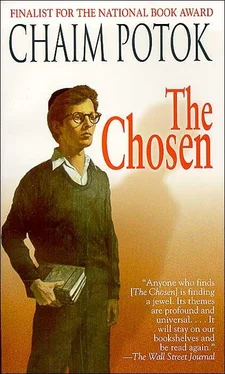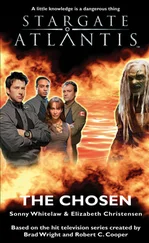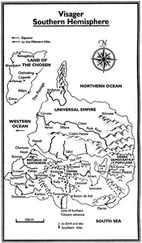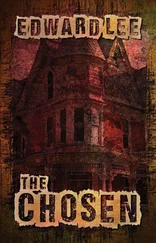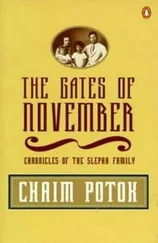We ate our supper listening to the radio – something we had never done before; my father never liked to have the radio on during a meal. But it was on during that meal and every other meal we ate that entire weekend – except for the Shabbat – and it stayed on every moment either my father or Manya or I was home.
I tried calling Danny on Friday afternoon, but he was still too sick to come to the phone. My father and I spent Shabbat morning in the synagogue, where the pain of death showed itself clearly on every face, and where my friends and I just stood around aimlessly after the service, not knowing what to say. My father began to cough again,· the deep, dry, racking cough that shook his frail body and frightened me terribly. On Shabbat afternoon, he talked of President Roosevelt, of the hope he had brought to the country during the Depression.
'You do not remember the Depression, Reuven,' he told me. 'Those were terrible days, black days. It is impossible to believe he is gone. It is like when -' His voice broke, and he was suddenly sobbing. I stared at him, feeling helpless and terrified. He went into his bedroom and stayed there the rest of the afternoon, and I lay on my bed, staring up at the ceiling, my hands clasped behind my head, trying to grasp what had happened. I couldn't. I saw only emptiness and fear and a kind of sudden, total end to things that I had never experienced before. I lay on my bed and thought about it a long time. It was senseless, as – I held my breath, feeling myself shiver with fear – as Billy's blindness was senseless. That was it. It was as senseless, as empty of meaning, as Billy's blindness. I lay there and thought of Roosevelt being dead and Billy being blind, and finally I turned over and lay with my face on the pillow and felt myself crying. I cried a long time. Then I slept, fitfully. When I woke, the room was dark, and I heard the radio going again in the kitchen. I lay on the bed a while, then joined my father. We sat together in the kitchen. It was after midnight when we went to sleep.
The next day, President Roosevelt was buried. Our school was closed for the funeral, and my father and I sat in the kitchen all that day and listened to the radio.
Danny called me a few hours after the funeral. He sounded tired, and he coughed a good deal. But his temperature was down to normal, he said, and he had been normal for twenty-four hours now. Yes, Roosevelt's death was a terrible thing, he said. His parents were all right. His brother was sick, though. He was running a high fever, and coughing. Could I come over during the week? he asked me. I didn't think so. Could I come over on Saturday, then? Yes, I could, I would see him on Shabbat, I said. He sounded relieved when we hung up, and I wondered what was happening.
But on Wednesday I came home from school with a fever, and by Thursday afternoon I was running 103.6 The doctor called it the flu and warned my father to keep me in bed or there might be complications. I asked my father to call Danny and tell him. I was in bed for ten days, and when I finally got back to school I found I had missed so much work that for two weeks I dropped all my student council activities and spent every moment I had catching up. I used Shabbat afternoons for reading, and by the first week of May I had caught up enough to be able to begin attending student council meetings again. Then Reb Saunders became ill, and at the same time my father also took to his bed with the flu, a severe case that bordered on pneumonia for a while and frightened me terribly. Both Reb Saunders and my father were quite ill on the day in May when word finally came that the war in Europe was over.
I was with my father when we heard the news over the radio in his bedroom.
'Thank God!' my father said, his eyes wet with joy. 'What a price to have paid for Hitler and his madmen!' And he lay back on the pillow and closed his eyes.
And then, together with the official report of the signing of the unconditional surrender on May 7, there came the news, at first somewhat guarded, then, a few days later, dear and outspoken, of the German concentration camps. My father, recuperating slowly and looking worn and weary, sat in his bed propped on pillows, and read the newspaper stories of the horrors that had occurred in those camps, His face was grim and ashen. He seemed unable to believe what he was reading.
It was while my father, read to me an account of what had happened at Teresienstadt, where the Germans had imprisoned and incinerated European Jews of culture and learning, that I saw him break down and weep like a child.
, I didn't know what to say. I saw him lie back on his pillows and cover his face with his hands. Then he asked me to leave him alone, and I walked out and left him there, crying, and went to my room.
I just couldn't grasp it. The numbers of Jews slaughtered had gone from one million to three million to four million, and almost every article we read said that the last count was still incomplete, the final number would probably reach six million. I couldn't begin to imagine six million of my people murdered. I lay in my bed and asked myself what sense it made. It didn't make any sense at all. My mind couldn't hold on to it, to the death of six million people.
Danny called me a few days later, and I went over to his house the next Shabbat afternoon. We did not study Talmud. Instead, his father talked of the Jewish world in Europe, of the people he had known who were now probably dead, of the brutality of the world, of his years in Russia with the Cossack bands looting and plundering.
'The world kills us,' he said quietly. 'Ah, how the world kills us.'
We were sitting in his study, and he was in his straightbacked chair. His face was lined with suffering. His body swayed slowly back and forth, and he talked in a quiet singsong, calling up the memories of his youth in Russia and telling us of the Jewish communities of Poland, Lithuania, Russia, Germany, and Hungary – all gone now into heaps of bones and ashes. Danny and I sat silent and listened to him talk. Danny was pale and seemed tense and distraught. He tugged constantly at an earlock, his eyes blinking nervously.
'How the world drinks our blood,' Reb Saunders said. 'How the world makes us suffer. It is the will of God. We must accept the will of God.' He was silent for a long moment. Then he raised his eyes and said softly, 'Master of the Universe, how do you permit such a thing to happen?'
The question hung in the air like a sigh of pain.
Danny could not walk me back that night, he had too much schoolwork to do, so I went home alone and found my father in his bedroom, listening to the radio. He was in pajamas, and he wore his small black skullcap. The announcer was talking about the United Nations. I sat in a chair and listened, and when the news program was over my father turned off the radio and looked at me.
'How is Reb Saunders?' he asked quietly.
I told him what Reb Saunders had talked about that afternoon. My father nodded slowly. He was pale and gaunt, and his skin had a yellowish tint to it and was parchment like on his face and hands.
'Reb Saunders wanted to know how God could let something like this happen,' I told him quietly.
My father looked at me, his eyes somber.
'And did God answer him?' he asked. His voice had a strange quality of bitterness to it.
I didn't say anything.
'Did God answer him, Reuven?' my father asked again, that same bitterness in his voice.
'Reb Saunders said it was God's will. We have to accept God's will, he said.'
My father blinked his eyes. 'Reb Saunders said it was God's will: he echoed softly.
I nodded.
'You are satisfied with that answer, Reuven?'
'No.'
He blinked his eyes again, and when he spoke his voice was soft, the bitterness gone. 'I am not satisfied with it, either, Reuven. We cannot wait for God. If there is an answer, we must make it ourselves.'
Читать дальше
